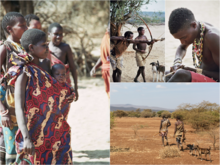
Back هادزا Arabic Хадза Byelorussian Хадзапи Bulgarian Hadzové Czech Hadsa Welsh Hadza German Hadzoj Esperanto Pueblo hadza Spanish Hatsad Estonian Hadzat Finnish
Wahadza | |
|---|---|
 Hadza in Karatu District, Arusha Region | |
| Total population | |
| 1,200–1,300[1] | |
| Regions with significant populations | |
Karatu District, Arusha Region | |
| Languages | |
| Hadza, Isanzu, Sukuma & Swahili | |
| Related ethnic groups | |
| None known[2] |
The Hadza, or Hadzabe (Wahadzabe, in Swahili),[3][4] are a protected hunter-gatherer Tanzanian indigenous ethnic group, primarily based in Baray, an administrative ward within Karatu District in southwest Arusha Region. They live around the Lake Eyasi basin in the central Rift Valley and in the neighboring Serengeti Plateau. As descendants of Tanzania's aboriginal, pre-Bantu expansion hunter-gatherer population, they have probably occupied their current territory for thousands of years with relatively little modification to their basic way of life until the last century.[5] They have no known close genetic relatives[2] and their language is considered an isolate.
Since the first European contact in the late 19th century, governments and missionaries have made many attempts to settle the Hadza by introducing farming and Christianity. These efforts have largely failed, and many Hadza still pursue a life similar to their ancestors. Since the 18th century, the Hadza have come into increasing contact with Pastoralist peoples entering Hadzaland, sometimes declining in population. Tourism and safari hunting have also affected them in recent years.[6]
Hadza people traditionally live in bands or 'camps' of around 20-30 people, and their social structures are egalitarian and non-hierarchical. Traditionally, they primarily forage for food, eating mostly honey, tubers, fruit, and, especially in the dry season, meat. As of 2015, there are between 1,200 and 1,300 Hadza people living in Tanzania.[7] Only around a third of the remaining Hadza still survive exclusively by traditional foraging.[1][8]
- ^ a b Skannes, Thea (2015). "Notes on Hadza cosmology: Epeme, objects and rituals". Hunter Gatherer Research. 2 (1): 247–267. doi:10.3828/hgr.2015.13.
- ^ a b Cite error: The named reference
Tishkoff et al 2007was invoked but never defined (see the help page). - ^ In the Hadza language, hazabee [ɦad͜zabeʔe̥] is the feminine plural form of haza 'human being'. The Hadza call themselves the hazabee 'people' and their language hazane 'as the people'. Other spellings in English are Hadzapi (from hazaphii [ɦad͜zapʰiʔi̥] 'they (male) are people') and Hatsa; other ethnonyms applied to the Hadza include Tindiga (from Swahili; human plural Watindiga), Kindiga, Kangeju (with a German j) and Wahi (with a German w). In current English usage, Hadza is the most commonly used term.
- ^ Marlowe, F. W. (2010). The Hadza: Hunter-Gatherers of Tanzania. Berkeley: Univ. California Press. ISBN 978-0-520-25342-1.
- ^ Marlowe 2010, pp. 17–18, 285–286
- ^ Peterson, Daudi (2013). Hadzabe: By the Light of a Million Fires. Mkuki na Nyota Publishers. This book includes descriptions of Hadza myths, culture, and modern struggles.
- ^ Marlowe 2010, p. 13
- ^ Marlowe, Frank (2002). "Why the Hadza are Still Hunter-Gatherers" (PDF). Ethnicity, Hunter-Gatherers, and the "Other": Association or Assimilation in Africa: 247–275.
© MMXXIII Rich X Search. We shall prevail. All rights reserved. Rich X Search